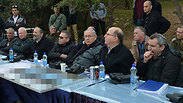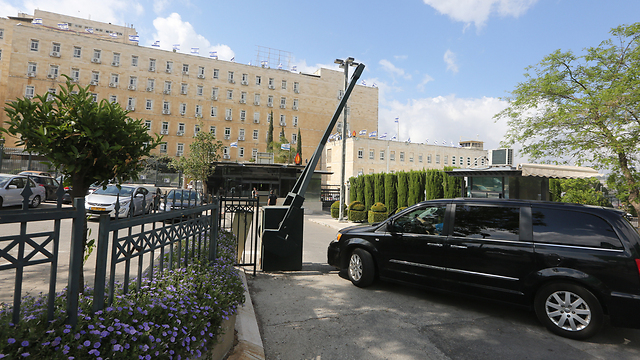
Security Cabinet meeting in northern Israel (Archives)
צילום: קובי גדעון
How the Security Cabinet should really work
Op-ed: A cabinet discussion on any new issue must be held according to three fundamental issues: Israel’s interests, the alternatives and the thoroughness of the discussion.
The leaks from the Security Cabinet discussion, as published by Yedioth Ahronoth on Tuesday, preceded the public discourse on the state comptroller’s report on Operation Protective Edge. Beyond the political and personal attacks, there are three fundamental issues that should be addressed in this context: The interests, the alternatives and the thoroughness.

A Security cabinet discussion on any new issue must begin with a definition of and an agreement on Israel’s interests. Everything that is decided after that should be examined according to that criterion. A national interest is not a heart’s desire, but something vital that we will be willing to pay a price to achieve. For example, in regards to Gaza, both in 2014 and today all we have is a security interest. We have no territorial, economic or political interest regarding who will control Gaza. If there are other opinions, that is exactly what the cabinet discussion should focus on.

Ministers arrive at Security Cabinet meeting. The quality of the discussions must be addressed (Archive photo: Gil Yohanan) (צילום: גיל יוחנן)
The Israeli security interest (that there will be a calm and that Hamas will have trouble arming itself) is faced by Hamas’ interest, and it has only one interest in the coming years—to remain in power. For that purpose, it needs two things: an improvement in the economic situation and international legitimacy. The conflict of interests between Israel and Hamas is not big, which is highly significant when it comes to the question of whether to launch a military operation or whether the conflict could be prevented in a different way.
The second thing has to do with the alternatives. In most cabinet discussions, after the ministers listen to annoying intelligence briefings, the nitty gritty stage allegedly arrives: The prime minister asks the army to present its plan, the chief of staff or his representatives present it, and then a free discussion begins. Most ministers fall into the detail trap and start asking micro-tactical questions. The military leaders actually like it, as mastering the details is not a real challenge.
What the ministers should do is always ask one opening question: What were the other alternatives you considered and why did you favor the one you just presented to us? If this question is not asked, it creates a dangerous situation in which the cabinet allegedly has only two options—to approve the army’s plan or reject it.
It would be better, of course, for the army to arrive with all the alternatives, regardless of the one it recommends. In the case of Protective Edge, for example, it could have presented four alternatives: One, to settle for airstrikes; two, to add ground activity as deep as 1 kilometer for the sake of neutralizing the tunnels; three, to include a ground encirclement of a significant territory (Gaza City, for example); and four, to occupy the entire strip.
A full presentation of alternatives will require the army to elaborate on each alterative. The second alternative, for example, would have required the army to provide a full explanation on the neutralization of the tunnels. The army’s recommendation will be an important factor in the decision, but such a method of presentation provides legitimacy for other alternatives as well.
The third thing has to do with the thoroughness of the discussion. On a tactical level, there is almost complete congruence between the extent of delving into details and the thoroughness level. A thorough company commander is a commander who makes sure before a battle that all his soldiers have calibrated their weapon, that their equipment is intact and that every soldier is fully prepared to carry out their mission. The higher one goes, the thoroughness is inverted: On a strategic level, the more one goes into details, the more the discussion becomes superficial rather than thorough.
There are those who are impressed by the fact that a cabinet discussion lasts seven hours. My impression is different: It usually points to dealing with irrelevant issues. Moreover, an extension of cabinet discussions, particularly at times of fighting, creates a huge burden on the chief of staff and senior army officials, who should rather dedicate these precious hours to issues under their responsibility.
I have yet to see the state comptroller’s report on the cabinet’s performance, but from the leaks it seems that the comptroller missed the most important thing too: addressing the quality of processes in the cabinet discussions.
Major-General (res.) Giora Eiland is a former head of Israel's National Security Council.










